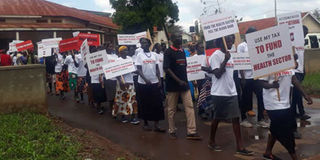Gulu residents protest over blood shortage

Gulu residents march to call upon government to increase funding to the health sector in a bid to ensure availability of safe blood in health facilities across the country. Photo by Anthony Wesaka
What you need to know:
- Earlier in the day, during a public dialogue held at the Town Council hall, Mr Ben Odongo, an official from ministry of health, outlined a number of reasons that make people shy away from donating blood hence the shortages being faced.
Several residents in Gulu municipality on Thursday evening, took to the streets to protest over shortage of safe blood.
Armed with placards, the residents marched in a peaceful demonstration to demand that government increases funding to the health sector to ensure availability of safe blood for all the citizens who need it. This follows recent reports of several maternal deaths in different health facilities across the country due to blood shortage.
The residents who started marching from the District headquarters through the town, carried placards with words like; "Fund the health sector, fill the blood bank", "Solve the bloody problem", "Use my tax to fund the health sector."
Hemorrhage is one the leading causes of maternal deaths in the country, accounting for 48.5 percent of the deaths.
Ms Anne Lumbasi, the senior programme officer for Centre for Health, Human Rights and Development, said beyond treating the haemorrhage among women and girls giving birth, blood is critical for other conditions which also rank highly in causes of death across all cases of the population. She added that anaemia was ranked number three among the leading causes of death while injuries from road accidents was ranked sixth which both require availability of blood.
"Today (Thursday), the community in Gulu is raising their voices through a public procession and a public dialogue to put pressure on government to allocate more domestic funding to the health sector so that the Uganda Blood Transfusion services meets its annual budget and targets of collecting 410,000 units of blood recommended by the World Health Organization (WHO)," Ms Lumbasi said.
Earlier in the day, during a public dialogue held at the Town Council hall, Mr Ben Odongo, an official from ministry of health, outlined a number of reasons that make people shy away from donating blood hence the shortages being faced.
Fear of the unknown of what virus your blood might be carrying, myths about blood donation like your blood levels dropping after the donation, being prone to sickness after donating blood were some of the reasons that Mr Odongo said could be scaring people from freely donating blood.
Ms Edith Sifuna, the Programmes Associate at Centre for Health, Human Rights and Development said as a coalition to stop maternal mortality deaths, they started urging people across the country to demand from government more funding of the health sector and that ahead of the International Women’s Day, a signed up petition would have been delivered to the Speaker of Parliament Rebecca Kadaga for action.
Government committed to fund the health sector to a tune of 15 percent of the national budget annually, in line with the Abuja declaration. However, in the current financial year 2019/20, the health sector was allocated only 6.4 percent of the total national budget.




